初中英语近义词、同义词、词组、短语辨析大全
初中英语近义词、同义词、词组、短语辨析大全 同义词辨析 第12组
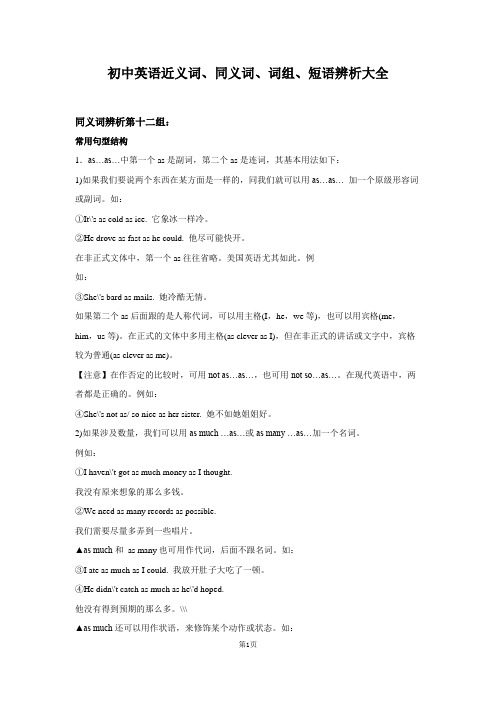
初中英语近义词、同义词、词组、短语辨析大全同义词辨析第十二组:常用句型结构1.as…as…中第一个as是副词,第二个as是连词,其基本用法如下:1)如果我们要说两个东西在某方面是一样的,同我们就可以用as…as… 加一个原级形容词或副词。
如:①It\'s as cold as ice. 它象冰一样冷。
②He drove as fast as he could. 他尽可能快开。
在非正式文体中,第一个as往往省略。
美国英语尤其如此。
例如:③She\'s bard as mails. 她冷酷无情。
如果第二个as后面跟的是人称代词,可以用主格(I,he,we等),也可以用宾格(me,him,us等)。
在正式的文体中多用主格(as clever as I),但在非正式的讲话或文字中,宾格较为普通(as clever as me)。
【注意】在作否定的比较时,可用not as…as…,也可用not so…as…。
在现代英语中,两者都是正确的。
例如:④She\'s not as/ so nice as her sister. 她不如她姐姐好。
2)如果涉及数量,我们可以用as much …as…或as many …as…加一个名词。
例如:①I haven\'t got as much money as I thought.我没有原来想象的那么多钱。
②We need as many records as possible.我们需要尽量多弄到一些唱片。
▲as much和as many也可用作代词,后面不跟名词。
如:③I ate as much as I could. 我放开肚子大吃了一顿。
④He didn\'t catch as much as he\'d hoped.他没有得到预期的那么多。
\\\▲as much还可以用作状语,来修饰某个动作或状态。
如:⑤You ought to rest as much as possible. 你应当尽量多休息。
初中英语近义词、同义词、词组、短语辨析大全 S-T
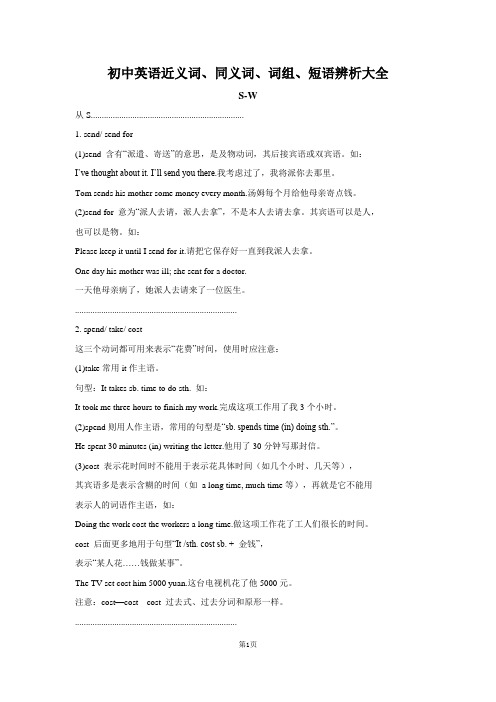
初中英语近义词、同义词、词组、短语辨析大全S-W从S......................................................................1. send/ send for(1)send 含有“派遣、寄送”的意思,是及物动词,其后接宾语或双宾语。
如:I’ve thought about it. I’ll send you there.我考虑过了,我将派你去那里。
Tom sends his mother some money every month.汤姆每个月给他母亲寄点钱。
(2)send for 意为“派人去请,派人去拿”,不是本人去请去拿。
其宾语可以是人,也可以是物。
如:Please keep it until I send for it.请把它保存好一直到我派人去拿。
One day his mother was ill; she sent for a doctor.一天他母亲病了,她派人去请来了一位医生。
..........................................................................2. spend/ take/ cost这三个动词都可用来表示“花费”时间,使用时应注意:(1)take常用it作主语。
句型:It takes sb. time to do sth. 如:It took me three hours to finish my work.完成这项工作用了我3个小时。
(2)spend则用人作主语,常用的句型是“sb. spends time (in) doing sth.”。
He spent 30 minutes (in) writing the letter.他用了30分钟写那封信。
(3)cost 表示花时间时不能用于表示花具体时间(如几个小时、几天等),其宾语多是表示含糊的时间(如a long time, much time等),再就是它不能用表示人的词语作主语,如:Doing the work cost the workers a long time.做这项工作花了工人们很长的时间。
初中英语经典短语及同义词组

初中英语同义词组1.arrive in/at=get to=reach2.be fine=be well=be OK3.be from=come from4.be in=be at home5.be full of=be filled with6.be late for=come late for7.be on a visit to= visit8.be able to=can9.be away=be out10.be busy doing sth.=be busy with sth.11.be pleased=be glad=be happy12.buy sb. Sth.=buy sth. to sb13.be up=get up14.catch up with=keep up with15.catch a bus=take a bus16.catch a cold=have a colde into=step intoe on=come alonge down=get down20.do well in=be good at21.do the shopping=go shopping22.drop off=get off23.enjoy doing sth.=like doing sth.24.have a good time=enjoy oneself25.fall down=fall off26.get the telephone=answer the telephone27.give sb.sth.=give sth.to sb.28.give sb.the message=give the message to sb.29.give sb. a talk=give a talk to sb.30.give a concert=have a concert31.get on well with sb.=be good to32.give…a call=give…a ring33.go down=go along34.go for a swim=go swimming35.go on doing sth.=go on with sth.36.go up=go along37.go to sleep=get to sleep=fall asleep38.have a look (at)=look at39.have a swim=go swimming40.have got=have41.hear from=receive a letter from=have a letter from=get a letter from42.help sb with sth=help sb to do sth43.hold a meeting=have a meeting44.hold on=wait a minute45.hurry up=be quick46.knock at=knock onst from…to=be from…to48.like doing sth=like to do sth49.look out=be careful50.love to do sth=like to do sth51.make up one’s mind to do=set one’s mind to do52.pay for=spend on53.prefer…to=like b etter than54.ring up=call sb55.send for sb=ask sb to come56.show sb sth=show sth to sb57.take care of=look after58.take exercise=do sport59.take a message=leave a message60.think about=think of61.teach oneself=learn all by oneself62.turn off=turn down63.turn right at the…crossing=take the …turning on the right64.walk on=go on65.walk to=go to …on foot66.walk along=go along67.at school=in the school68.a lot of=lots of69.a lot=very much70.a quarter past two=two fifteen71.at times=sometimes72.at last=in the end=finally73.a bit=a little=a few74.a moment ago=just now75.at once=right now76.at noon=in the middle of a day77.at that moment=at that time=just then78.at the moment=at the same time79.at the doctor’s=in the doctor’s office80.all over the world=across the world=around the world=in the world81.a moment later=later on82.after a while=a moment later83.all the same=all the time84.as soon as possible=as quick as possible85.in line=in a queue86.in the southern part of=in the south of87.in the day=in the daytime88.much of China=many places of China89.more than=over90.no longer=not…any longer=no more=not any more91.not far from=near to92.North China=the north of China93.of course=certainly94.plenty of=quite a few=a lot of=lots of=large number of=a great many of=a good deal of95.two and a half years=two years and a half初中英语同义词组1. arrive in/at=get to=reachI arrived at the airport at 10.=I reach the airport at 10.注意这里不能用arrive in2. be fine=be well=be OKI’m fine=I’m well.=I’m OK.3. be from=come fromHe is from China.=He comes from China.4. be in=be at homeHe is in.=He is at home.同理:be out= be not at home5. be full of=be filled withThe bottle is full of orange.=The bottle is filled with orange.6. be late for=come late forI’m sorry, I’m late for the meeting.=I’m sorry, I come late for the meeting.7. be on a visit to= visitHe is on a visit to China.= He is visiting China8. be able to=canHe was able to ride a bike at the age of 5.=He could ride a bike when he was 5.9. be away=be out=be not at home10. be busy doing sth.=be busy with sth.He is busy doing his homework.=He is busy with his homework.11. be pleased=be glad=be happyThe coach was pleased with their performance.=The coach was glad with their performance.=The coach was happy with their performance.12. buy sb. Sth.=buy sth. to sbMy mother bought me a book.=My mother bought a book to me.13. be up=get upBe up, Tom!=Get up, Tom.14. catch up with=keep up withI can catch up with others.=I can keep up with others.15. catch a bus=take a busCan I catch a bus?/Can I take a bus?16. catch a cold=have a coldOh, no! You’ve caught a cold.=Oh, no! You’ve had a cold.17. come into=step intoHe came into the classroom.=He stepped into the classroom18. come down=get downCome down! That’s dangerous.=Get down! That’s dangerous.19. do well in=be good atHe does well in swimming.=He is good at swimming.20. do the shopping=go shoppingI’ll do the shopping.=I’ll go shopping.21. drop off=get off22. enjoy doing sth.=like doing sth.I enjoy reading.=I like reading.23. have a good time=enjoy oneselfWe had a good time at the party.=We enjoyed ourselves at the party.24. fall down=fall offI fell down.=I fell off the bike.25. get the telephone=answer the telephoneI got the telephone.= I answered the telephone.26. give sb.sth.=give sth.to sb.27. give sb.the message=give the message to sb.28. give sb. a talk=give a talk to sb.29. give a concert=have a concertThey gave a concert.=They had a concert.30. get on well with sb.=be good toI got on well with my neighbors=I’m good to my neighbors.31. give…a call=give…a ringI gave a call to you.=I give you a ring.32. go down=go along33. go for a swim=go swimming34. go on doing sth.=go on with sth.35. go up=go along36. go to sleep=get to sleep=fall asleep37. have a look (at)=look at38. have a swim=go swimming39. have got=have40. hear from=receive a letter from=have a letter from=get a letter from41. help sb with sth=help sb to do sth42. hold a meeting=have a meeting43. hold on=wait a minute44. hurry up=be quick45. knock at=knock on46. last from…to=be from…to47. like doing sth=like to do sth48. look out=be careful49. love to do sth=like to do sth50. make up one’s mind to do=set one’s mind to do51. pay for=spend on52. prefer…to=like better than53. ring up=call sb54. send for sb=ask sb to come55. show sb sth=show sth to sb56. take care of=look after57. take exercise=do sport58. take a message=leave a message59. think about=think of60. teach oneself=learn all by oneself61. turn off=turn down62. turn right at the…crossing=take the …turning on the right63. walk on=go on64. walk to=go to …on foot65. walk along=go along66. at school=in the school67. a lot of=lots of68. a lot=very much69. a quarter past two=two fifteen70. at times=sometimes71. at last=in the end=finally72. a bit=a little=a few73. a moment ago=just now74. at once=right now75. at noon=in the middle of a day76. at that moment=at that time=just then77. at the moment=at the same time78. at the doctor’s=in the doctor’s office79. all over the world=across the world=around the world=in the world80. a moment later=later on81. after a while=a moment later82. all the same=all the time83. as soon as possible=as quick as possible84. in line=in a queue85. in the southern part of=in the south of86. in the day=in the daytime87. much of China=many places of China88. more than=over89. no longer=not…any longer=no more=not any more90. not far from=near to91. North China=the north of China92. of course=certainly93. plenty of=quite a few=a lot of=lots of=large number of=a great many of=a good deal of94. two and a half years=two years and a halfthink up=come up withgive out=hand outuse up=run out ofcall up=ring upinstead of=in place oftake after=likeset up=eatablishbe angry with=be mad oflose one's way=get losetry one's best=do one's bestgo to sleep=get to sleep=fall asleepin the end=at last=finally=at the end ofmake a decision=decide to dobe surprise at=be amazed ateven thought=even ifno long=not...any longertake pride in=be pround ofgive up=stop doingworry about=be worried aboutbe confident of doing=have confidence in doingnot....in the slightest=not at allplenty of=lots of=a lot ofget along with=get on withbe anxious about=be worried abouton diaplay=on showwhatever=no matter whatexpect sb. to do=wish sb.to dostay away from=keep away fromconsider doing=think about doingcontinue doing=go on dingtake after=be similar tobe filled with=be full ofat once=right awaydonate...to=give away...tobe used for=be used to doby accident=be chance同义句转换训练是初中英语学习的重点,也是学生学习的难点,同义句转换虽不是中考的专题了,但它可以出现在听力测试、选择题、写作中。
初中英语近义词、同义词、词组、短语辨析大全 同义词辨析 第10组

初中英语近义词、同义词、词组、短语辨析大全同义词辨析第十组:重点词语用法1.sound----词的用法1)sound作名词,意为“声音”,有可数和不可数两种用法。
如:①Strange sounds came from the next room.(作可数名词)奇怪的声音来自隔壁房间。
②Sound travels at 340 metres per second on air.(作不可数名词)。
声音以每秒340米的速度在空气中传播。
【注意】sound,voice和noise三个词都表示声音,但用法不同,其区别如下:①sound指任何能听到的声音。
如:the sound of voices说话声the sound of music音乐声the sound of breaking glass 打碎玻璃的声音②voice指人的说话声或唱歌声。
如:She has sweet voice. 她的声音甜美。
③noise通常指较大的使人不快的声音。
如:Stop making so much noise!不要弄出这么大的声响!2)sound作连系动词,意为“听起来”,“听上去(给人以某种印象)”,常接形容词作表语,不接副词。
还可接名词,介词短语或从句。
如:①Your cough sounds better. 你的咳嗽听起来好些了。
②That sounds like a good idea!那听起来是个好主意。
③It sounds as if(as though) the government doesn\'t know what to do.听起来好像政府不知道该怎么办。
3)sound作及物动词,意为“发出声音”、“发(音)”;作不及物动词,意为“发声”、“响”。
如:①The bell sounded for dinner at eight o\'clock.晚餐铃声八点钟响。
②A bell is sounded at eight o\'clock.八点钟时敲响铃子。
初中英语近义词、同义词、词组、短语辨析大全 同义词辨析 第9组
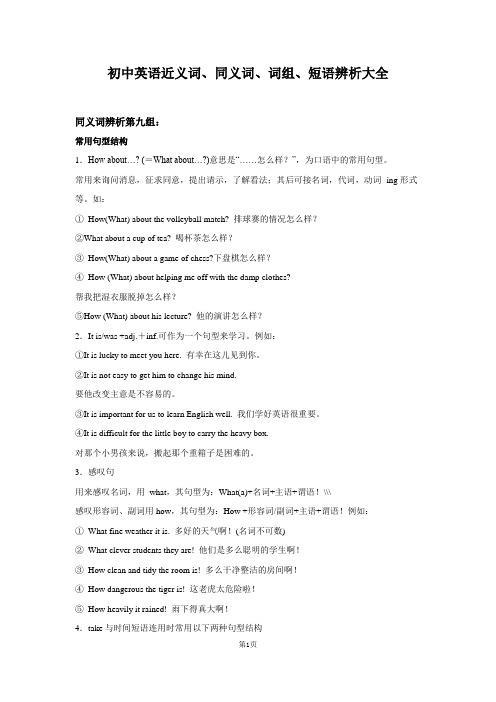
初中英语近义词、同义词、词组、短语辨析大全同义词辨析第九组:常用句型结构1.How about…? (=What about…?)意思是“……怎么样?”,为口语中的常用句型。
常用来询问消息,征求同意,提出请示,了解看法;其后可接名词,代词,动词- ing形式等。
如:①How(What) about the volleyball match? 排球赛的情况怎么样?②What about a cup of tea? 喝杯茶怎么样?③How(What) about a game of chess?下盘棋怎么样?④How (What) about helping me off with the damp clothes?帮我把湿衣服脱掉怎么样?⑤How (What) about his lecture? 他的演讲怎么样?2.It is/was +adj.+inf.可作为一个句型来学习。
例如:①It is lucky to meet you here. 有幸在这儿见到你。
②It is not easy to get him to change his mind.要他改变主意是不容易的。
③It is important for us to learn English well. 我们学好英语很重要。
④It is difficult for the little boy to carry the heavy box.对那个小男孩来说,搬起那个重箱子是困难的。
3.感叹句用来感叹名词,用what,其句型为:What(a)+名词+主语+谓语!\\\感叹形容词、副词用how,其句型为:How +形容词/副词+主语+谓语!例如:①What fine weather it is. 多好的天气啊!(名词不可数)②What clever students they are! 他们是多么聪明的学生啊!③How clean and tidy the room is! 多么干净整洁的房间啊!④How dangerous the tiger is! 这老虎太危险啦!⑤How heavily it rained! 雨下得真大啊!4.take与时间短语连用时常用以下两种句型结构第1页1)“It takes/took(+人)+时间+动词不定式”。
初中英语近义词、同义词、词组、短语辨析大全 同义词辨析 第6组

初中英语近义词、同义词、词组、短语辨析大全同义词辨析第六组:重要词组短语1.in English意为“使用英语”,in表示“用某种语言”。
例如:②Can you speak in Japanese? 你可以用日语讲话吗?②This article was written in American English.这篇文章是用美国英语写成的。
2.written English意为“书面英语”;spoken English意为“口语英语”;Englishspeaking country意为“讲英语的国家”;spelling differences意为“拼写差异”。
例如:①He is good at written English. 他的书面英语很好。
②They practise speaking in English in order to improve their spoken English.他们练习用英语讲话,以提高英语口语水平。
③The USA, Canada, Australia, England and New Zealand are all English-speaking countries. 美国、加拿大、澳大利亚、英国、新西兰都是讲英语的国家。
3.more or less 意为“或多或少”,“在一定程度上”,表示自己的意见不那么肯定。
例如:①We hope our explanation will prove more or less helpful.希望我们的说明多少能有些帮助。
②I must have given him a hundred pounds more or less.我给他的钱大约有一百英镑了。
③His teaching method has more or less improved.他的教学方法多少有些改进了。
④The repairs to the house will cost¥5,000 more or less.修理这座房子将花费大约5,000元。
初中英语“近义词”汇总[修改版]
![初中英语“近义词”汇总[修改版]](https://img.taocdn.com/s3/m/3e2e5d285022aaea988f0f97.png)
第一篇:初中英语“近义词”汇总1.happen ,take place二者都有“发生”的意思。
happen指事情的发生,往往带有“偶然”的意思。
It happens that I am free today. 恰好今天我没有事。
take place指事先安排或策划好而后发生,没有“偶然”的意思。
2. must,have to must表示说话人的主观看法;而have to则表示客观需要。
mustn't意为“不可以;不允许”;don't have to意为“不必”。
如:(1)My father had to work when he was ten years old。
(2)The play is not interesting. I really must go now。
3. arrive ,reach ,get to三者都有“到达”之意。
reach为及物动词。
They reached Tianjin yesterday.昨天他们到达天津。
arrive为不及物动词,后面接介词in或at。
get to 常用于口语,可代替前二者。
4.because ,because of二者均表示“因为”because是连词,引导状语从句。
We stayed at home because it rained. 因为下雨,我们呆在家。
because of是短语介词,后面接名词性词语。
We stayed at home because of the rain . 因为下雨,我们呆在家。
5. in front of,in the front of in front of…意思是“在……前面”,指甲物在乙物之前,两者互不包括;其反义词是behind(在……的后面)。
如:He walked in fount of me。
他走在我的前面。
There are some flowers in fount of the house。
初中英语近义词、同义词、词组、短语辨析大全 同义词辨析 第2组

初中英语近义词、同义词、词组、短语辨析大全同义词辨析第二组:1. many, much, a lot of(lots of),plenty of, a number of,a good(great)dealof﹡many用来修饰可数名词,表示数目,反义词为few。
如:There are many apples in the basket.篮子里有许多苹果。
﹡much用来修饰不可数名词,表示量,反义词为little。
如:I’m sorry to give you so much trouble.真对不起,给你添了这么多的麻烦。
﹡a lot of(lots of)既可修饰可数名词又可修饰不可数名词。
修饰可数名词时可与many换用;修饰不可数名词时,可与much换用。
如:A lot of(Lots of)people think so.很多人都这样想。
﹡plenty of意为“足够”、“许多”、“大量”,它既可修饰可数名词又可修饰不可数名词。
如:I didn’t hurry because I had plenty of time.我没有匆忙,因为我有足够的时间。
﹡a number of修饰可数名词的复数形式,它修饰的词作主语时,谓语动词用复数形式。
它意为“有些”时可与some换用;意为“许多”时,可与many,a lot of,plenty of换用。
如:I have a number of letters to write. 我有一些信要写。
﹡a good (great) deal of 只用于修饰不可数名词,可与much 换用。
它修饰的词作主语时,谓语动词用单数形式。
如:I spent a great deal of time (in)doing my homework.我花费了相当多的时间做家庭作业。
..........................................................................2. spend,take,cost,pay﹡spend的宾语通常是时间、金钱。
初中英语近义词、同义词、词组、短语辨析大全 同义词辨析 第11组

初中英语近义词、同义词、词组、短语辨析大全同义词辨析第十一组:1.reach 的用法reach [ri:tM] vt. 到达,抵达。
表示到达之意的还有arrive at (in) , get to 等。
例如:①The president reached Beijing by special plane yesterday.总统昨天乘专机到达北京。
②We reached here Thursday morning. 我们是星期四早晨到达这里的。
③Dr Bethune arrived in Yanan in the spring of 1938.白求恩大夫于1938年春到达延安。
④When did you arrive in Europe? 你何时到达欧洲?⑤She was always the first to arrive at the workshop. 她总是第一个来到车间。
⑥They arrived at the station at two o\'clock. 他们两点钟来到车站。
⑦We must get to the airport before 8.我们必须在八点钟前到机场。
⑧When did you get home yesterday? 你昨天什么时候到家的?⑨“When did the train arrived?” “Half an hour ago.”火车何时到达的?半小时之前。
【注意】在指到达一个洲、国家、城市等大地方时,arrive后多用in;而在指到达一个小地方时,多用at。
但如将一个城市当作一个点看待,也可用at。
例如:①Mary arrived in Shanghai last month. 玛丽上月到达上海。
②We arrived at the small village in the evening. 我们傍晚到达那个小村庄。
③The train arrived at Jinan at ten o\' clock. 火车十点钟抵达济南站。
初中英语近义词、同义词、词组、短语辨析大全 同义词辨析 第8组

初中英语近义词、同义词、词组、短语辨析大全同义词辨析第八组:重要词组短语1.see sb. off意为“为某人送行”。
例如:①I saw him off for Beijing yesterday.我昨天送他动身到北京去。
②Mary saw him off at the bus station.玛丽把他送到汽车站。
2.注意下列短语的用法by bus 乘汽车by train 乘火车by air 乘飞机by boat 乘船by land 陆路by sea 水路on foot 步行在上述短语中,名词前不用冠词,但在ride in a bus/car(乘坐汽车)和take a bus/taxi短语中则要用冠词。
\\\ 3.say“Hi”to的含义say“Hi”to相当于say hello to,是一种常用的问候语。
其构成形式为动词+名词+介词。
另外类似的还有:say good-bye to向……告别say sorry to向……致歉say yes/OK to同意……say no to不同意take care of关心,照料pay attention to注意例如:①Let\'s drive over there in the afternoon and say hello to him.我们下午开车去向他问好。
②You must pay attention to what you hear on the tape.你一定要注意你听到的录音。
4.see sb. doing sth. 意为“看见某人做某事”see 为感官动词,通常可跟动词-ing形式或不带to的不定式作宾语。
常见的感官动词还有:hear,watch,notice,observe等。
例如:①I saw him walk up the hill.我看着他继续上山(动作的全过程)。
②I saw him walking up the hill.我看见他正在上山。
初中英语近义词、同义词、词组、短语辨析大全 C-F

初中英语近义词、同义词、词组、短语辨析大全C/D/E/F从C......................................................................1. can / be able to(1)can表示“本能”或能够,有一般时和过去时,后接动词原形一起构成谓语。
I can sing the English song.我会唱这首英语歌。
A baby can cry when it is hungry.婴儿饿的时候会哭闹。
(2)be able to 后接动词原形,表示“能够”,多指一个人经过后天的努力从而获取的一种“能力”,有各种时态。
If you work hard, you will be able to master English.只要你努力,你一定能掌握好英语的。
..........................................................................2. catch a cold/ have a cold一般情况下,这两个短语都表示“得了感冒,患了感冒”但有所侧重:(1)catch a cold 强调动作。
如:It’s cold outside. Go into the house or you will catch a cold.外面冷。
到房间里去吧,不然你会感冒的。
(2)have a cold 强调状态。
I have had a cold for several days and I can’t get rid of it.我感冒已经好几天了,可还是好不了。
从D......................................................................1. die/ dead/ dying/ death(1)die 是终止性动词,不用于被动语态。
初中英语近义词、同义词、词组、短语辨析大全
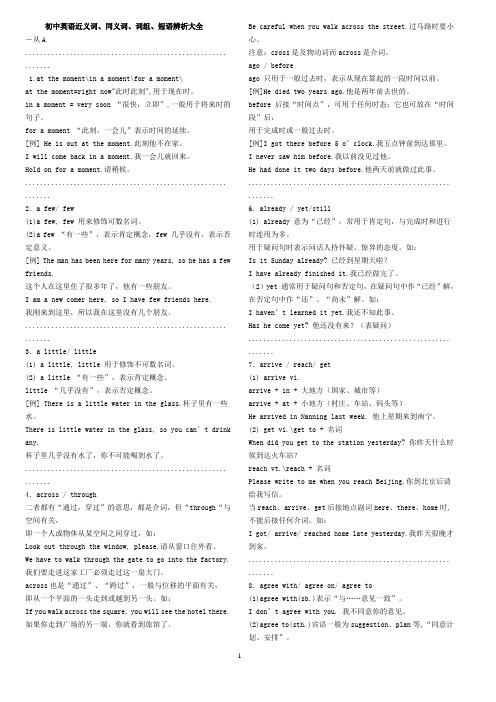
初中英语近义词、同义词、词组、短语辨析大全-从A ...................................................... .......1.at the moment\in a moment\for a moment\at the moment=right now"此时此刻",用于现在时。
in a moment = very soon “很快,立即”,一般用于将来时的句子。
for a moment “此刻,一会儿”表示时间的延续。
[例] He is out at the moment.此刻他不在家。
I will come back in a moment.我一会儿就回来。
Hold on for a moment.请稍候。
...................................................... .......2.a few/ few(1)a few, few 用来修饰可数名词。
(2)a few “有一些”,表示肯定概念,few 几乎没有,表示否定意义。
[例] The man has been here for many years, so he has a few friends.这个人在这里住了很多年了,他有一些朋友。
I am a new comer here, so I have few friends here.我刚来到这里,所以我在这里没有几个朋友。
...................................................... .......3.a little/ little(1) a little, little 用于修饰不可数名词。
(2) a little “有一些”,表示肯定概念。
little “几乎没有”,表示否定概念。
[例] There is a little water in the glass.杯子里有一些水。
初中英语近义词、同义词、词组、短语辨析大全 同义词辨析 第1组

初中英语近义词、同义词、词组、短语辨析大全同义词辨析第一组:1.smile-laugh*smile 的意思是“微笑”,强调“笑”的时候不发出声音。
例如:She smiled at me. 她向我微笑。
(动词)I was welcomed with a smile. 我受到了笑脸相迎。
(名词)﹡laugh 的意思是“大笑”,强调“笑”的时候发出声音。
例如:He laughed at my joke. 他听了我讲的话笑起来。
I gave a hearty laugh.我发自内心地笑了起来。
..........................................................................2.noise, sound, voice这三个词都表示声音,但意思上有区别:﹡noise 指的是人们不愿意听到的“噪声” 表示“噪音,喧闹声”,一般指嘈杂,吵闹等令人不快的声音。
如:The noise of the street kept me awake.街上的吵闹声让我睡不着。
The noise of the rain nearly drowned out our conversation.雨声大得几乎超过了我们的谈话声。
﹡sound 泛指你能听到的“声音”。
表示“声音”,含义很广泛,指任何可以听到的声音,包括悦耳及令人不快的声音。
如:All of a sudden there was the sound of shots and a cry.突然,有了枪响声和哭声。
如:Did you hear the strange sound from the next room this morning?今天早上你是否听到隔壁房间发出的怪声音?﹡voice 则指说话和唱歌的“嗓音”。
一般指人说话,唱歌或笑的声音。
如:The little girl has a beautiful voice.这个小女孩有一副好嗓子。
初中英语同义词辨析

初中英语同义词辨析英语学习过程中经常遇到同义、近义词的辨析,这是英语学习的难点之一,也是中考考点之一,现在把自己整理的一些初中常见的同义近义词的辨析放在这里,和朋友们交流,也供学生朋友选择学习。
1、talk tell speak sayspeak 和talk 通常用作不及物动词,都有“说话”之意。
在会议上发言用speak,名词为speech;随便漫谈用talk,其名词还是talk;tell表示“讲述”或“告诉”;say表示“说”;例如:can we speak about plans for the holidays?我们谈谈假期的打算好吗?the patient is too weak to speak.病人太衰弱了,不能说话。
my father was talking with my teacher when i got home yesterday。
昨天我到家时我父亲正在和我的老师谈话。
i always tell my daughter a story before she goes to sleep.女儿睡觉之前,我总讲故事给她听。
it‘s impossible to tell who will win the next election.下届选举谁能获胜无法预知。
she said nothing to me about it.关于这一点,她什么也没有对我讲。
*speak 当及物动词用时,宾语一般是语言或词语之类的词。
如: does anyone speak english here? 这儿有人会说英语吗?2、good well nicegood 形容词,好的,合适的,新鲜的,擅长的。
well 作形容词时,指"(身体)健康的”;还可用作副词,修饰动词。
nice形容词,美好的,令人愉快的,可爱的,特指取悦感官的事物。
she is good at english.她擅长英语。
this cake tastes good.这蛋糕好吃。
初中英语近义词、同义词、词组、短语辨析大全 I-L

初中英语近义词、同义词、词组、短语辨析大全I/J/K/L从I......................................................................1. interesting / interested这是两个由动词interest转化而来的分词形容词,现在分词表示进行,表示主动意义,过去分词表示完成,表示被动意义,因此:(1)物作主语时,表语要用-ing形容词。
如:The news is interesting.这消息是有趣的。
(2)人作主语时,表语要用-ed形容词。
如:I am interested in the book.我对这本书感兴趣。
..........................................................................2.in all/ at all/ of all/ after all这些含有all 的短语的意义与all 的本意无关,极易混淆。
(1)in all“总计、总共”,在句中作状语There are 60 students in our class in all.我们班共有60个学生。
(2)at all“全然,根本不”,一般用于否定句中加强语气。
She doesn’t like football at all. 她一点也不喜欢足球。
(3)after all “毕竟、终究、到底”,一般置于句首或句尾作状语。
After all, he is a child.毕竟,他还是个孩子。
They finished the work after all.他们最终完成了工作。
..........................................................................3.in time/ on time/ at times(1)in time 指“及时”,表示动作“在规定时间内”或提前发生。
初中英语近义词、同义词、词组、短语辨析大全.

初中英语近义词、同义词、词组、短语辨析大全A1.at the moment\in a moment\for a moment\at the moment=right now"此时此刻",用于现在时。
in a moment = very soon “很快,立即”,一般用于将来时的句子。
for a moment “此刻,一会儿”表示时间的延续。
[例] He is out at the moment.此刻他不在家。
I will come back in a moment.我一会儿就回来。
Hold on for a moment.请稍候。
.............................................................2.a few/ few(1)a few, few 用来修饰可数名词。
(2)a few “有一些”,表示肯定概念,few 几乎没有,表示否定意义。
[例] The man has been here for many years, so he has a few friends.这个人在这里住了很多年了,他有一些朋友。
I am a new comer here, so I have few friends here.我刚来到这里,所以我在这里没有几个朋友。
.............................................................3.a little/ little(1) a little, little 用于修饰不可数名词。
(2) a little “有一些”,表示肯定概念。
little “几乎没有”,表示否定概念。
[例] There is a little water in the glass.杯子里有一些水。
There is little water in the glass, so you can’t drink any.杯子里几乎没有水了,你不可能喝到水了。
初中英语近义词、同义词、词组、短语辨析大全

初中英语近义词、同义词、词组、短语辨析大全1. look for, find, find out﹡ look for 是“动词 + 介词”结构,意为“寻找”,表示正在进行的动作;﹡ find 意为“找到,发现”,多指偶然性的,表示look for 之后的结果;﹡ find out 是“动词 + 副词”结构,意为“找出查,明”,指通过观察而发现事实的真相,调查后找出原因等。
同时要注意课文中出现的find句型:find sb. / sth. doing sth. 发现某人(某物)在做某事;find it hard / difficult to do sth. 发现做某事是难的。
例如:What are you looking for? 你在找什么?They found the lost child hiding in the cave.他们发现走失了的孩子藏在山洞里。
Did you find out why he was late? 他迟到的原因你查清了吗?★............................................★............................................★2.worth 的用法worth,worthy,worth-while都为adj.意为"值得"。
1. worth: be worth + n.当名词为金钱时,表示"……值得……"be worth doing sth."……某事值得被做"The question is not worth discussing again and again.2. worthy:be worthy of +n.当名词为抽象名词时表示"……值得……"be worthy to be done "某事值得被做"The question is not worthy to be discussed againand again.3. worth-while: be worth-while to do sth "值得做某事"worth while: It is worth while doing sthIt is worth while sb to do sth. .............................................................................典型例题It is not ____ to discuss the question again and again.A.worthB.worthyC.worth-whileD.worth while答案C. 由worth的用法可知,此句只适合词组be worth-while to do sth.。
初中英语近义词、同义词、词组、短语辨析大全

初中英语近义词、同义词、词组、短语辨析大全英近、同、、短辨析大全A1.at the moment\in a moment\for a moment\at the moment=right now"此此刻",用于在。
in a moment = very soon“很快,马上”, 一般用于未来的句子。
for a moment“此刻,一会儿”表示的延。
[ 例 ] He is out at the moment.此刻他不在家。
I will come back in a moment.我一会儿就回来。
Hold on for a moment.稍候。
.............................................................2. a few/ few(1)a few, few用来修可数名。
(2)a few“有一些”,表示必定观点,few 几乎没有,表示否认意。
[ 例 ] The man has been here for many years, so he has a few friends.个人在里住了好多年了,他有一些朋友。
I am a new comer here, so I have few friends here.我到达里,所以我在里没有几个朋友。
.............................................................3. a little/ little(1) a little, little用于修不行数名。
(2) a little“有一些”,表示必定观点。
little“几乎没有”,表示否认观点。
[ 例 ] There is a little water in the glass.杯子里有一些水。
There is little water in the glass, so you can’ t drink any.杯子里几乎没有水了,你不行能喝到水了。
初中英语近义词、同义词、词组、短语辨析大全 同义词辨析 第14组
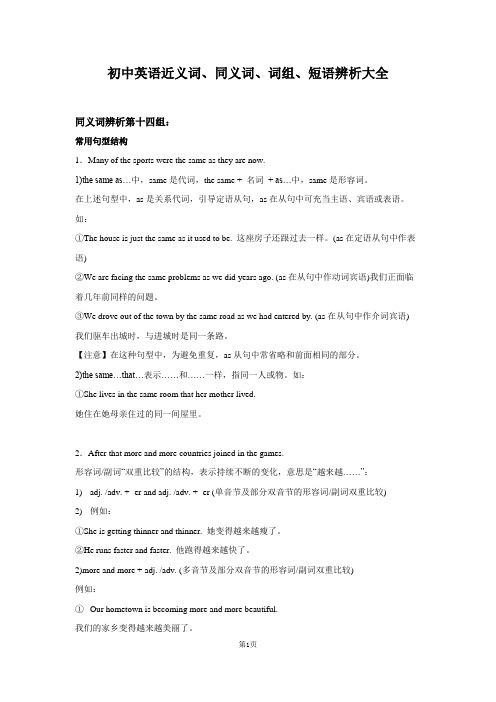
初中英语近义词、同义词、词组、短语辨析大全同义词辨析第十四组:常用句型结构1.Many of the sports were the same as they are now.1)the same as…中,same是代词,the same + 名词+ as…中,same是形容词。
在上述句型中,as是关系代词,引导定语从句,as在从句中可充当主语、宾语或表语。
如:①The house is just the same as it used to be. 这座房子还跟过去一样。
(as在定语从句中作表语)②We are facing the same problems as we did years ago. (as在从句中作动词宾语)我们正面临着几年前同样的问题。
③We drove out of the town by the same road as we had entered by. (as在从句中作介词宾语) 我们驱车出城时,与进城时是同一条路。
【注意】在这种句型中,为避免重复,as从句中常省略和前面相同的部分。
2)the same…that…表示……和……一样,指同一人或物。
如:①She lives in the same room that her mother lived.她住在她母亲住过的同一间屋里。
2.After that more and more countries joined in the games.形容词/副词“双重比较”的结构,表示持续不断的变化,意思是“越来越……”:1)adj. /adv. + -er and adj. /adv. + -er (单音节及部分双音节的形容词/副词双重比较)2)例如:①She is getting thinner and thinner. 她变得越来越瘦了。
②He runs faster and faster. 他跑得越来越快了。
2)more and more + adj. /adv. (多音节及部分双音节的形容词/副词双重比较)例如:①Our hometown is becoming more and more beautiful.我们的家乡变得越来越美丽了。
- 1、下载文档前请自行甄别文档内容的完整性,平台不提供额外的编辑、内容补充、找答案等附加服务。
- 2、"仅部分预览"的文档,不可在线预览部分如存在完整性等问题,可反馈申请退款(可完整预览的文档不适用该条件!)。
- 3、如文档侵犯您的权益,请联系客服反馈,我们会尽快为您处理(人工客服工作时间:9:00-18:30)。
初中英语近义词、同义词、词组、短语辨析大全A1.at the moment\in a moment\for a moment\at the moment=right now"此时此刻",用于现在时。
in a moment = very soon “很快,立即”,一般用于将来时的句子。
for a moment “此刻,一会儿”表示时间的延续。
[例] He is out at the moment.此刻他不在家。
I will come back in a moment.我一会儿就回来。
Hold on for a moment.请稍候。
.............................................................2.a few/ few(1)a few, few 用来修饰可数名词。
(2)a few “有一些”,表示肯定概念,few 几乎没有,表示否定意义。
[例] The man has been here for many years, so he has a few friends. 这个人在这里住了很多年了,他有一些朋友。
I am a new comer here, so I have few friends here.我刚来到这里,所以我在这里没有几个朋友。
.............................................................3.a little/ little(1) a little, little 用于修饰不可数名词。
(2) a little “有一些”,表示肯定概念。
little “几乎没有”,表示否定概念。
[例] There is a little water in the glass.杯子里有一些水。
There is little water in the glass, so you can’t drink any.杯子里几乎没有水了,你不可能喝到水了。
............................................................. 4.across / through二者都有“通过,穿过”的意思,都是介词,但“through“与空间有关,即一个人或物体从某空间之间穿过,如:Look out through the window, please.请从窗口往外看。
We have to walk through the gate to go into the factory.我们要走进这家工厂必须走过这一扇大门。
across也是“通过”、“跨过”,一般与位移的平面有关,即从一个平面的一头走到或越到另一头。
如:If you walk across the square, you will see the hotel there.如果你走到广场的另一端,你就看到旅馆了。
Be careful when you walk across the street.过马路时要小心。
注意:cross是及物动词而across是介词。
ago / before ago 只用于一般过去时,表示从现在算起的一段时间以前。
[例]He died two years ago.他是两年前去世的。
before 后接“时间点”,可用于任何时态;它也可放在“时间段”后,用于完成时或一般过去时。
[例]I got there before 5 o’clock.我五点钟前到达那里。
I never saw him before.我以前没见过他。
He had done it two days before.他两天前就做过此事。
.............................................................6. already / yet/still(1) already 意为“已经”,常用于肯定句,与完成时和进行时连用为多。
用于疑问句时表示问话人持怀疑、惊异的态度。
如:Is it Sunday already? 已经到星期天啦?I have already finished it.我已经做完了。
(2)yet 通常用于疑问句和否定句,在疑问句中作“已经”解,在否定句中作“还”、“尚未”解。
如:I haven’t learned it yet.我还不知此事。
Has he come yet? 他还没有来?(表疑问).............................................................7.arrive / reach/ get(1) arrive vi.arrive + in + 大地方(国家、城市等)arrive + at + 小地方(村庄、车站、码头等)He arrived in Nanning last week. 他上星期来到南宁。
(2) get vi.\get to + 名词When did you get to the station yesterday? 你昨天什么时候到达火车站?reach vt.\reach + 名词Please write to me when you reach Beijing.你到北京后请给我写信。
当reach、arrive、get后接地点副词here、there、home时,不能后接任何介词。
如:I got/ arrive/ reached home late yesterday.我昨天很晚才到家。
.............................................................8. agree with/ agree on/ agree to(1)agree with(sb.)表示“与……意见一致”。
I don’t agree with you. 我不同意你的意见。
(2)agree to(sth.)宾语一般为suggestion、plan等,“同意计划、安排”。
We all agreed to your plan. 我们同意你的计划。
(3)agree on 表示“双方就...达成一致协议”。
China and the U.S.A. agreed on the place and time for the next meeting.中美双方就下次会议的时间、地点问题达成了协议。
..........................................................................9. a bit/ a little二者都有“一点儿”的意思,用法上既有相同点,也有不同点。
(1)相同点:都用来修饰形容词、副词及其比较级,也可修饰动词。
Get up a bit/ a little earlier, and you will see the star.起早一点你就会看到星星了。
(2)不同点:①a little+不可数名词,a bit of+不可数名词He ate a little food/ a bit of food this morning.他今天早上吃了一点食物。
②a little 与a bit 和否定词连用,意义大不相同。
not a little 很,非常;\ not a bit 一点也不从B............................................................1.by the way/ on the way/ in the way(1)by the way 常用作状语,意为“顺便问一下”,“顺便说一下”。
(2)on the way “在……的路上”,后接名词时需加介词to,后接副词home、here、there时不加to。
(3)in the way “挡路、妨碍”。
[例]Your car is in the way.你的小汽车挡路了。
He bought a pen on his/ the way to school.他在上学的路上买了一枝钢笔。
By the way, how old are you? 顺便问一下,你多大了?..........................................................................2. be afraid/ be afraid of/ be afraid for(1)be afraid意为“害怕”,如果后接宾语从句,意为“恐怕……”,用来表示常有歉意的回话或引出令人不满意的消息。
I am afraid I can’t help you.我恐怕帮不了你的忙。
(2)be afraid of+名词/代词/动名词,意为“害怕某人/做某事”,往往指长期具有的心理状态。
I am afraid of going out at night.我害怕晚上出去。
be afraid for后习惯接表示人的代词,表示“替某人担心”。
如:I am afraid for you.我替你担心。
.............................................................3. be made of/be made in/be made by这三个短语都是及物动词make的被动结构,其后所接介词的不同,其所表达的意义就不同:be made of 后接的是表示材料的名词,“……由……组成”。
The desk is made of wood.(2)be made in 后接的是表示地点的名词,“……由……制造”。
The computer is made in China.这台电脑是中国制造的。
(3)be made by 后接的名词是人,即“……是由……来制作(造)的”。
This ship is made by us Chinese.这艘船是我们中国人制造的。
.......................................................................... 4. between/ among这两个词都有“在……之间(中)”的意思,但用法不同:(1)between用于表示双方之间的关系,不论双方的数目是多少。
The train runs between Beijing and Nanning.火车在北京和南宁两地间运行。
There is a tree between the two houses.这两座房子之间有一棵树。
(2)among后接人或物必须是三个或三个以上,在一群、一组或一个整体中间。
